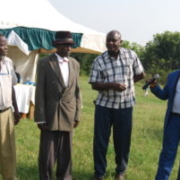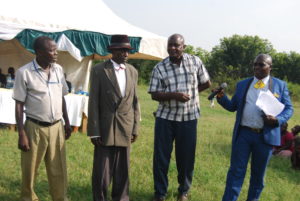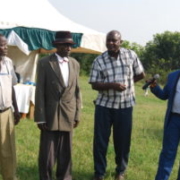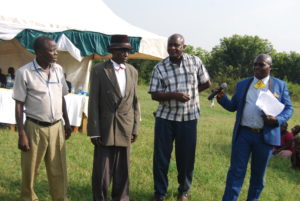Money Lenders Kicked Out of Kikuube
KIKUUBE – Kikuube local government together with the office of the Resident District Commissioner (RDC) have ordered all money lenders (Bank Etambula) operating in the district to stop operating their business in the district over their continuous habit of cheating poor people.
This order follows increasing complaints from the public, mostly women who accuse money lenders of confiscating their property illegally.
The complaints triggered an operation headed by Kikuube district boss Peter Banura and the Resident District Commissioner, Amlan Tumusiime which saw five women regaining their properties that had been confiscated by money lenders (Bank Etambula) in Buhimba town council, Kikuube district last week.
The women included; Agnes Tuhaise Baganda 45, Katusabe Muhereza 64, Kaahwa Yasinta and Olva Kiiza 44 years.
Properties belonging to these residents of Buhimba town council had been confiscated by a money lender identified as Johnson Kagoma, while Sanny Kanturaki’s property had been confiscated by Francis Ayeranga.
Tuhaise says that in 2019, she borrowed six million from Kagoma and used her three acres of land with a house on wall plate level valued at Shs 30 million as collateral.
https://thecooperator.news/district-chairman-vows-to-revive-cooperatives/
I started paying the loan as we had agreed, however after paying Shs 3 million in 2020, Kagoma refused to take the balance from me and decided to take my land claiming he had bought it.
“Kagoma started hiding from me whenever I would go to pay him; I went to his father and begged him to talk to his son to accept his money but my plea fell on deaf ears and when the period they had agreed to pay the loan elapsed, the man fenced my land and denied me access to my gardens,” Tuhaise explained.
She added that she moved in different offices including police and court but she did not get any help adding all offices she went to seek help, they told her that Kagoma is untouchable.
Another victim Muhereza borrowed Shs 200, 000 and used her one acre of land as collateral. She claims that when she started to pay, the money lender refused to take the balance of the money from her on the grounds that she had delayed to pay.
Muhereza explained that last year, her son who was fighting to ensure that she regains her land was arrested by police accusing him of trespassing.
In 2017, my child fell sick and I went to Kagoma and borrowed Shs 200, 000 to take my child to hospital and I was supposed to pay him Shs 60,000 every month for five months.
Within five months I had paid him Shs 315,000 but this man claimed that he was still demanding me interest amounting Shs 400, 000, I agreed to pay this money; however, when I got the money to pay him, he refused to take the money claiming the agreed date had expired.
Muhereza claimed that the man forced her out of her land and fenced it and denied her access to her land and house.
Kaahwa and Kiiza each borrowed Shs 500, 000 from Kagoma and used their plots of land as collateral. The duo claimed that they repaid all loans with the interest but the money lender refused to return their agreements and claimed ownership of their land.
All the victims of Kagoma expressed concern that Kagoma is untouchable adding that they moved to different offices seeking for assistance in vain.
“I want to tell you Mr. RDC, this man has bribed most of the officers, when you go to police to report a case against Kagoma instead of helping you, police turn against the complainant and they arrest him or her,” Kaahwa said.
Another victim, Sanny told the district officials that she borrowed Shs 1.5 million from Ayeranga last year and used her plot where her small house is as collateral.
According to Sanny in February this year, she paid all the money but Ayeranga refused to return her agreement and took possession of the plot and house.
I was forced to seek your intervention RDC after begging this man to give me my plot agreement several times and he refused. I thank you RDC, today I am very happy that you have restored my hope by rescuing my land which Ayeranga had confiscated.
It was this sudden story of the poor women that forced the district leadership of Kikuube to intervene and allowed the vulnerable women to regain their property.
RDC Tumusiime, explained that the women were evicted from their land and house without any court order.
He vowed not to tolerate such impunity and called on money lenders to use legal means of recovering their money instead of confiscating people’s property illegally.
“We have returned all the property these money leaders had confiscated from the affected women and I ask the money leaders to take the district security committee to court instead of disturbing these women. We agreed as the district security committee to rescue them because as you have heard from them, they have moved to different offices and nobody would listen to them,” RDC said.
RDC Tumusiime also suspended all the activities of money leaders in the district adding that most of them operate illegally without a license.
He warned all local council 1 chairpersons in the district against stamping on any money lending document of Bank Etambula. He threatened that any LC1 Chairperson who will be found stamping for any Bank Etambula will be arrested and prosecuted.
“The Chairperson LC1’s connive with money lenders to cheat the poor people, They take advantage of ignorant and needy borrowers and they force them to sign a sales agreement, instead of a borrowing agreement. After a short time, money leaders make u-turn and they claim ownership of the property of the borrowers. This is unacceptable, you can’t take someone’s property worth Shs 30 million for Shs 6million and Shs 500, 000!” he said.
Peter Banura, the Kikuube district boss said, that the district leadership will not allow this kind of cheating and urged people who have lost their properties to money lenders to report to the district to find a way of dealing with cheaters.
Johnson Kagoma, the accused money lender and resident of Kakooge, Buhimba town council, Kikuube district, asked Kikuube leaders to back off his property which he claims were genuinely acquired.
He said that he has all documentary evidence pertaining to how he acquired the land after undergoing due diligence from the victims, neighbors and local leaders and vowed to take legal action against the district leaders and RDC.
He vowed not to relinquish even an inch of the land saying the leaders can offer part of their family land to the said victims if they feel concerned.
Narbert Alibankooha of Narbert Alibankooha & company advocates said that currently the money lending business is regulated under Tier 4 Microfinance Institutions and Money Lenders Act 2016.
He noted that under this act, it only allows registered companies to carry out the business of money lending; adding individuals who engage in the business of lending money, do it illegally.
“All that money lending without being licensed is illegal and the borrowers are not supposed to pay interest to the lender,” he said.
Tier 4 Microfinance Institutions and Money Lenders Act 2016 was enacted after the business of money lending in Uganda became a risk as money lenders would end up taking over securities pledged for the money borrowed; the interests would be exorbitant and quite often compounded; and the borrowers would be forced to sign sale agreements and sign transfer documents in favor of the lender as part of the security for accessing credit.
Buy your copy of thecooperator magazine from one of our country- wide vending points or an e-copy on emag.thecooperator.news
The post Money Lenders Kicked Out of Kikuube appeared first on The Cooperator News.




